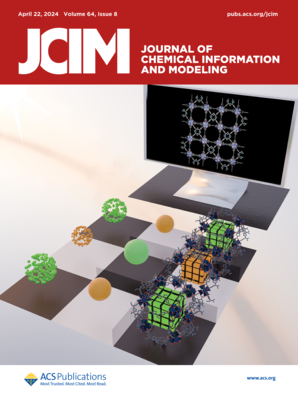Property-Oriented Reverse Design of Hydrocarbon Fuels Based on c-infoGAN.
IF 5.6
2区 化学
Q1 CHEMISTRY, MEDICINAL
引用次数: 0
Abstract
Fuel design is usually "forward": candidate molecular structures are designed first, and then their properties are predicted for screening. Owing to the large latent space of organic molecules (1060 order), reverse design by giving target fuel properties is urgently needed. However, it is hardly realized due to the unknown complex rule of the structure-property relationship. In this work, reverse design of hydrocarbon fuels is realized based on the conditional generative adversarial network of hydrocarbon molecules. Two deep generative models, c-GAN and c-infoGAN, are established and trained for generating new candidate fuel molecules when target fuel properties are input. c-infoGAN exhibited superior generation ability in terms of the validity, uniqueness, and novelty of the as-generated molecules. JP-10, a classical hydrocarbon fuel, was rediscovered by c-infoGAN. The latent space of fuels constructed by c-infoGAN is ordered, as proved by linear interpolation and linear algebra in this high-dimensional space. Given the target of high density, low freezing point, high heating value, and large specific impulse, 27 new fuel molecules with novel structures, high diversity, and expecting properties were designed. One of the as-designed fuels was experimentally synthesized and tested, which verifies the robust design ability of c-infoGAN. This work opens new avenues for the design of new hydrocarbon fuels to meet the strict requirements of next-generation engines.基于c-infoGAN的烃类燃料面向性能的逆向设计。
燃料设计通常是“前向”的:首先设计候选分子结构,然后预测其性质以进行筛选。由于有机分子的潜在空间大(1060阶),迫切需要基于目标燃料特性的反设计。但由于结构-性能关系的复杂规律未知,难以实现。本文基于烃分子的条件生成对抗网络,实现了烃燃料的逆向设计。建立并训练了c-GAN和c-infoGAN两个深度生成模型,用于在输入目标燃料特性时生成新的候选燃料分子。c-infoGAN在生成的分子的有效性、唯一性和新颖性方面表现出优越的生成能力。JP-10是一种经典的碳氢化合物燃料,由c-infoGAN重新发现。c-infoGAN构造的燃料潜在空间是有序的,并通过线性插值和线性代数在该高维空间中证明了这一点。以高密度、低凝固点、高热值、大比冲为目标,设计了27种结构新颖、多样性高、性能理想的新型燃料分子。实验合成并测试了一种符合设计要求的燃料,验证了c-infoGAN的稳健设计能力。这项工作为设计新的碳氢燃料开辟了新的途径,以满足下一代发动机的严格要求。
本文章由计算机程序翻译,如有差异,请以英文原文为准。
求助全文
约1分钟内获得全文
求助全文
来源期刊
CiteScore
9.80
自引率
10.70%
发文量
529
审稿时长
1.4 months
期刊介绍:
The Journal of Chemical Information and Modeling publishes papers reporting new methodology and/or important applications in the fields of chemical informatics and molecular modeling. Specific topics include the representation and computer-based searching of chemical databases, molecular modeling, computer-aided molecular design of new materials, catalysts, or ligands, development of new computational methods or efficient algorithms for chemical software, and biopharmaceutical chemistry including analyses of biological activity and other issues related to drug discovery.
Astute chemists, computer scientists, and information specialists look to this monthly’s insightful research studies, programming innovations, and software reviews to keep current with advances in this integral, multidisciplinary field.
As a subscriber you’ll stay abreast of database search systems, use of graph theory in chemical problems, substructure search systems, pattern recognition and clustering, analysis of chemical and physical data, molecular modeling, graphics and natural language interfaces, bibliometric and citation analysis, and synthesis design and reactions databases.

 求助内容:
求助内容: 应助结果提醒方式:
应助结果提醒方式:


